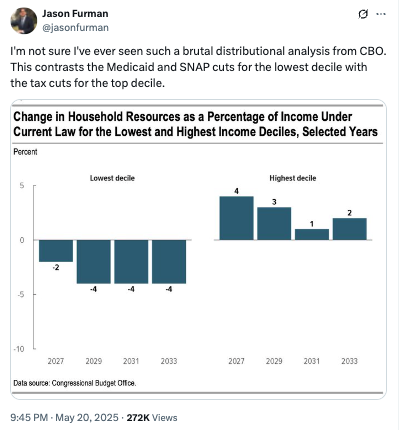Reality crept into Fox News’ coverage of the Republican tax bill on Monday when a Fox & Friends co-host acknowledged that the legislation will increase the budget deficit because the GOP Congress is prioritizing President Donald Trump’s tax cut agenda.
The White House and House Republican leaders seem to have adopted a strategy of flatly lying about the deficit implications of their “Big, Beautiful Bill.” Office of Management and Budget Director Russ Vought falsely claimed that the bill “doesn’t increase the deficit or hurt the debt” while House Speaker Mike Johnson (R-LA) falsely claimed it is “not going to add to the debt” in June 1 appearances on Sunday morning political talk shows.
But Fox & Friends' Ainsley Earhardt acknowledged the following morning that the bill will cause the deficit to increase due to its tax cuts — though she minimized by how much.
“I don't think anyone wants the deficit to go up,” Earhardt said. “But more importantly, it was the permanent tax cuts, it was no tax on tips, no tax on overtime, no tax on Social Security, that’s more important to the American people than seeing the deficit go up a little bit.”
“No one wants that, but they prefer to have these other things,” she added.
While Earhardt claimed that the bill would cause the deficit to rise only “a little bit,” nonpartisan budget analysts say it would “balloon federal deficits by well over $1 trillion.” The Congressional Budget Office, for example, found that the legislation’s “tax provisions would increase the federal deficit by $3.8 trillion over the decade, while the changes to Medicaid, food stamps and other services would tally $1 trillion in reduced spending,” for an overall increase in the debt of over $3 trillion over 10 years.
The legislation’s proposed spending cuts — while much too small to make the bill deficit-neutral given the mammoth size of the tax cuts — would nonetheless be devastating to millions of Americans. The bill would “reduce federal spending on Medicaid by at least $600 billion over a decade and reduce enrollment by about 10.3 million people,” according to the CBO, and “take food assistance away from millions of low-income families” through the “deepest cut” to food stamps “in history,” the Center on Budget and Policy Priorities found.
And while Earhardt directed attention to Trump’s campaign promises about cutting taxes on tipped income, overtime income, and Social Security, those account for a tiny fraction of the bill’s tax cuts. The bulk of the deficit increase is caused by the bill’s extension of Trump’s 2017 tax cuts, which disproportionately benefit the wealthiest Americans.
The CBO combined the impact of the tax and spending portions of the bill and found that it would reduce resources for the poorest households while increasing them for the richest.
At the same time, the bill is projected to fuel little economic growth and could trigger a bond market meltdown that could raise interest rates for consumers, increase borrowing costs, and threaten the broader economy.
As Earhardt might say, “no one wants that, but they prefer to have” tax cuts for the wealthiest Americans.


